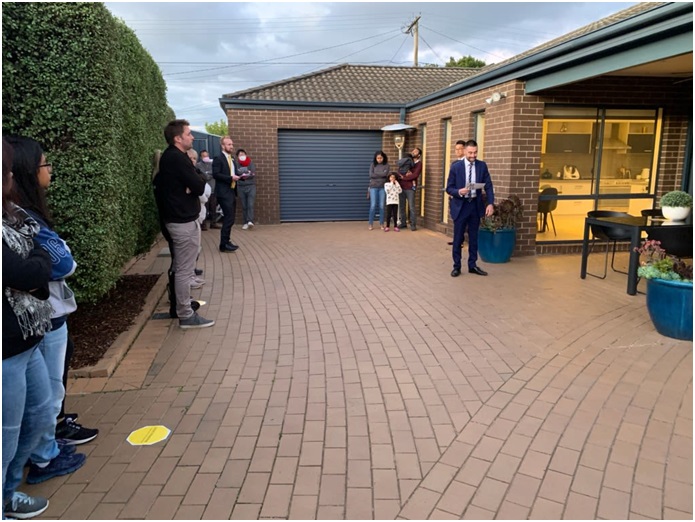The impact and prediction of real estate after COIVD-19 outbreak

In light of the impact of the COVID-19 which has delivered a wallop to Australia’s economy, the rate of unemployment has been increasing, and most businesses are now facing tough situations because of a string of restrictions on the general population’s movements imposed by Australian government such as travel bans, social distancing, office closures and other measures designed to respond to the COVID-19 crisis.
Policies on the real estate industry
Inevitably, the real estate industry has also suffered the loss of opportunities in the recent months as Prime Minister Scott Morrison has announced real estate auctions and open house inspections would have to stop in order to curb the spread of coronavirus.
Previously, agents had been allowed to show prospective buyers and tenants through properties even if people were living as long as they followed social distancing rule but now it is more rigorous. The new ban only allows inspection for future buyers and renters until a home is vacant, even if the agent is not present during inspection.
Now, real estate agencies take measures like online auction, private inspection, and the government has encouraged prospective buyers and renters to undertake virtual inspections of properties online, or wait until the property is empty and conduct sanitise before inspecting it.
Influence on the real estate industry & Australia’s finance

After Australian government banned private inspections of properties already occupied, Victoria’s multibillion-dollar real estate industry is widely expected to come to a halt. For example, the move to online auctions has pushed many sellers to sell privately. In the past, 1200 properties originally scheduled for auction, 65 per cent had become private sales. Real Estate Institute of Victoria president Leah Calnan said 95 per cent of properties for sale or rent were occupied, meaning only a fraction of transactions could occur, he also mentioned REIV figures show real estate contributes 46 per cent of tax revenue to the Victorian government. The Victorian total tax revenue expected in 2019-2020 was around $71 billion, according to estimates in last year’s state budget, and the lack of property sales would have an enormous impact on government coffers, with $10.5 billion expected to be raised through land transfer duties and stamp duty alone.
Predictions for the real estate industry post COVID-19
According to agencies database, we have seen a significant rise in search activity which is now 35 per cent more than this time last year. However, the high levels of search activity haven’t yet translated into high levels of enquiry, so how can we predict the trend based on current situations?
1. Rental housing will be most impacted but premium suburbs might withstand COVID-19
The rental market seems to have started creeping back because of a wide range of supportive measures from state government to protect tenants and landlords. However, there are still some areas that are struggling with rising vacancies. Particularly, those areas where are located close to universities and therefore typically accommodate both local and foreign students. Now many local students have returned to their family homes while many foreign students have not returned to Australia.
Premium suburbs in capital cities still acquire the highest views per listing. Though it is expecting to see some level of price drop in these areas, the demand and supply will provide a limit to how far they fall. People looking for bargains probably take big part of driving this high level of search but owners from premium suburbs are normally hoping to hold value best during downturns.

2. Auction activity is convinced to eventually return to normal
A ban on public auctions has led to a dramatic decline in auctions taking place with 95% of sales now made through other approaches. Though only few online auctions occured for now, it is believed that once the ban is canceled, action activity is more likely to return to normal. Since public auctions had worked very well in some markets, there is no doubt that many agents are expecting to get back to running them.
3. House & land will recover soon, industrial & agribusiness will hold their value.
Whether they are house and land or off-the-plan apartments, Investors and first homebuyers are both active buyers of new home. Normally, investors dominate apartment purchases while first home buyers are especially interested in house and land. Recently, the enquiry from buyers for new apartments are also increasing while that from investors are still down compared to earlier this year so it is convinced that the market for house and land will recover more quickly than the off-the-plan apartments.
Many commercial properties such as shopping centres, retail stores, hotels and office property for sale and lease have suffered a hammer blow, and seen some reduction in rent or values. Nevertheless, industrial and agribusiness seem to hold their value because of constant demand of leasing. It is likely that an acceleration of growth in online purchasing is driving this.
We understand as a buyer or seller, being informed of post COVID-19 in time is essential if you are planning to dive into the real estate industry. No matter you are new or have conducted some research in this field, Sightstone promises to provide premium services and real time information for you.








